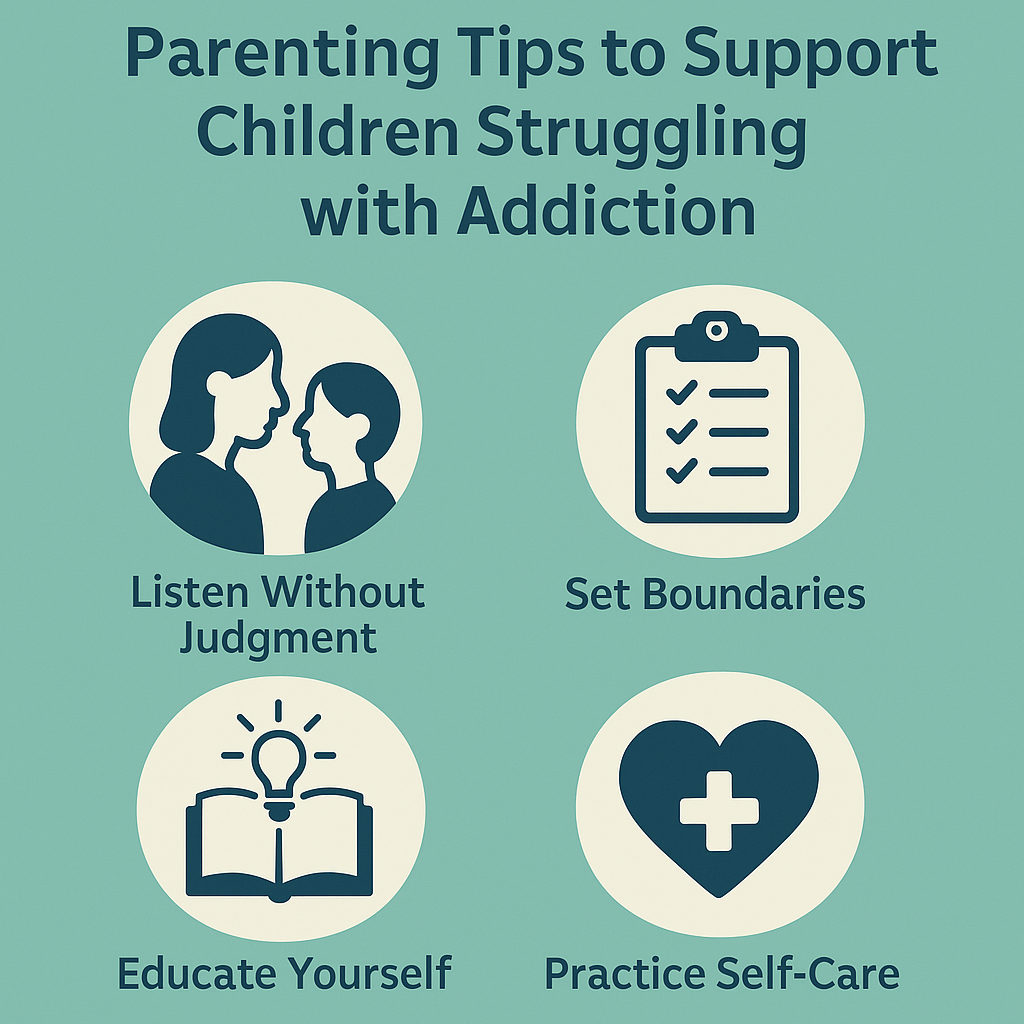Parenting a child facing addiction struggles is challenging and can feel overwhelming at times. Figuring out what works best for your family often means learning as you go. With the right strategies and understanding, you can take practical steps to support your child’s well-being and keep your family connected through tough times. Below are supportive strategies and simple tips for parents to make this adventure a little less daunting.
Understanding Addiction in Children and Teens
Addiction doesn’t always look like what you see in movies or on TV. For many kids and teens, things start small, maybe experimenting with substances or getting into certain behaviors to cope with stress or emotional pain. It can catch families off guard due to its rapid development. Knowing the basics is crucial in setting a foundation for support and action.
Addiction is a complex health condition. Science indicates that it’s a combination of genetics, environment, mental health, and personal choices. Teens, especially, are more vulnerable since their brains and decision-making skills are still developing. Signs of addiction might include a sudden drop in grades, changes in social groups, secrecy, loss of interest in favorite activities, or changes in mood and sleep. Sometimes, these signs are dismissed as typical teen behavior, so it’s helpful to stay informed and observant without being overly intrusive.
Family dynamics play a vital role. Support from parents and caregivers can help buffer against the worst impacts of addiction. If you’re not sure if what you’re seeing is addiction or just typical teenage behavior, talking to a healthcare professional can bring some much-needed clarity and peace of mind.
Creating a Supportive Home Environment
Kids struggling with addiction need more support than ever. Feeling judged or isolated at home often exacerbates the situation. Creating a safe, open, and supportive space at home is a great starting point, and it doesn’t need to be complicated or expensive. Sometimes, it simply means showing up and being present.
- Open Communication: Conduct regular check-ins without grilling your child; let them know you’re available and willing to listen.
- Consistency: Maintaining routines for meals, sleep, and family time helps preserve stability, which is often lost in the chaos of daily life.
- Nonjudgmental Listening: Sometimes, simply listening instead of jumping to problem-solving right away builds trust and lays the groundwork for a deeper understanding.
- Healthy Boundaries: Being clear about expectations and limits, while still offering love, keeps everyone on the same page and provides a sense of security.
It’s super important to show you care and at the same time, hold to boundaries that keep everyone safe. Setting clear, honest expectations can reduce confusion and conflict. Family therapy can also make a big difference, providing a neutral space for everyone to talk and learn together. Encouraging siblings to support each other in age-appropriate ways can further strengthen the family unit.
Practical Steps for Parents: What Actually Helps?
Knowing where to start can feel tricky. Here’s a step-by-step guide you can try if you think your child is struggling with addiction or risky behaviors. Being proactive and consistent increases your ability to support your child:
- Stay Calm: Emotional reactions are natural, but try not to let anger or panic steer your next steps. Kids respond better when things stay as level as possible. Practice pausing to collect your thoughts before addressing tough topics.
- Gather Information: Learn about what your child is experiencing, whether that’s substance use or behavioral addictions like gaming. Resources like SAMHSA or your pediatrician are a good starting point. Check out reputable books, podcasts, or even documentaries to help you dig into the topic.
- Reach Out for Help: It’s totally okay if you need outside help. School counselors, healthcare professionals, or local support groups can be invaluable. Private therapists can help guide families through difficult times. Don’t forget about hotlines or online forums that offer anonymous support, especially those available after hours.
- Set Up Healthy Routines: Keep the basics in place. Regular meals, routines, and sleep patterns are actually pretty powerful for restoring balance and reducing stress for everyone. Include time for family activities that encourage togetherness, even if just a board game night once a week.
- Model Self-Care: Kids pick up on what you do, not just what you say. Taking care of your own mental health isn’t selfish—it shows them how to do the same. Show them the importance of downtime, relaxation, and healthy coping mechanisms, such as talking things out or taking a walk to manage stress.
Not every step will work perfectly, so adapt as you go. Sometimes just sitting together in silence or sharing a favorite show can help you connect when conversation feels impossible. Remember, showing up is more important than saying the perfect thing.
What to Watch Out for and Common Challenges
Several challenges frequently arise for parents in this situation. These sticking points can add extra stress, but being aware of them can make them feel a little less overwhelming and help you be better prepared.
- Denial: Sometimes it feels easier to pretend things are fine, but facing the situation head-on is really important for healing. Avoid minimizing your concerns or your child’s struggles.
- Fear of Stigma: Worrying about what others will think is natural, but reaching out for support is a sign of strength, not failure. You’ll probably be surprised by how many families face similar experiences once you start speaking up.
- Burnout: Caring for someone you love through addiction takes a toll. Find small ways to recharge, whether it’s a quick walk, reading something funny, or chatting with a trusted friend. Remember, self-care is a necessity, not a luxury.
- Unrealistically High Expectations: Progress often means taking a few steps forward, only to take a step or two back. Celebrate small wins and keep things realistic. Adjust your expectations as everyone moves through the process.
Getting upset with yourself or your child for setbacks won’t do anyone much good. There’s no one-size-fits-all fix, so give yourself (and your child) permission to learn along the way. Lean on your support system—friends, extended family, or professional advisors, if needed.
Recognizing Triggers
Triggers are things that set off cravings or challenging emotions for your child. These can include people, places, specific dates, or even emotions like stress or boredom. Noticing triggers and working together on healthy ways to cope, such as exercise, creative hobbies, or mindfulness practices, can support your child’s recovery. You can track triggers and reactions together to see what needs to change. Consider involving your child in decisions about how to handle temptation, so they feel more empowered to make their own choices.
When to Seek Professional Help
If you notice drastic changes in mood, health, school performance, or if you feel worried about your child’s safety, it’s essential to reach out for professional help. This could be a therapist, doctor, addiction counselor, or a treatment center. There’s no “right” stage to get help; the earlier, the better, but it’s never too late to start. Professionals can also connect you and your family with specialized resources and tailor care plans to meet your specific needs.
Building Your Parenting Toolkit: Strategies and Skills
Having a few go-to strategies makes the unpredictable days a bit more manageable. These are skills that can be practiced. No one expects perfection right away, but small efforts lead to gradual improvement:
- Empathy: Showing compassion and understanding, even when you’re frustrated, lays the groundwork for trust. Try to imagine things from your child’s point of view to boost awareness.
- Positive Reinforcement: Noticing and praising small steps in the right direction goes a long way. Catch your child making positive choices and let them know you appreciate their efforts.
- Problem Solving: Work together on solutions. Ask your child how you can help, or what support would feel doable for them. Sometimes, just asking “what do you need right now?” opens the door to honest conversation.
- Self-Education: Learn about addiction, mental health, and recovery resources in your area. Books, podcasts, and community events are all worth checking out. Staying informed helps you respond rather than react.
- Flexibility: Plans may need to be adjusted, and goals may need to be modified. Rolling with those changes reduces family stress. Be open to trying new approaches if the old ones aren’t working.
Sometimes, writing down what’s working and what isn’t in a journal or notes app helps you spot patterns over time. This makes it easier to see progress, even when it feels slow in the moment. Don’t hesitate to share what you learn with other parents who may be walking a similar path.
Frequently Asked Questions (FAQs)
These are questions that come up a lot for parents facing similar situations:
How do I start a conversation about addiction with my child?
Pick a calm moment, avoid blame, and express concern using “I” statements. Try something like “I’ve noticed you seem down lately, and I care about you.” This makes it easier for your child to open up at their own pace.
Should I set consequences for risky behaviors?
Clear boundaries are essential, but consequences should aim to teach and protect, not punish. Involve your child in decision-making, so they feel a sense of ownership and know what to expect. This can also help prevent power struggles.
How can I take care of my own mental health during this time?
Find small ways to recharge each day. Connect with supportive friends, get outside, or join a parent support group. Self-care gives you more energy to be present for your child and helps you manage your emotions in healthy ways.
Is it normal to feel angry or resentful?
Absolutely. These emotions are human, and seeking support for yourself (through therapy, support groups, or trusted friends) can help prevent those feelings from turning into long-term resentment. Allowing yourself to feel what you feel is a key aspect of self-compassion.
Where can I find resources for my family?
Start with your pediatrician, local mental health clinics, or national resources, such as the Substance Abuse and Mental Health Services Administration (SAMHSA). Many schools also offer counseling or referrals. Joining online forums can lead you to more helpful connections and info.
Building Hope and Moving Forward
Helping a child recover from addiction is a long process. It’s more of a marathon than a sprint, but your presence and support are truly significant. Keep talking, learning, and reaching out for help when you need it. Every step, no matter how small, is a sign of progress. You’re not alone in this. Brighter days can and do happen as families continue working through challenges together. Hold onto hope and celebrate the progress, even in small doses.
Video: The Secret To Helping Your Child Overcome Addiction

